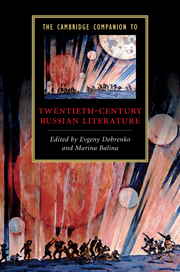Book contents
- Frontmatter
- 1 Poetry of the Silver Age
- 2 Prose between Symbolism and Realism
- 3 Poetry of the Revolution
- 4 Prose of the Revolution
- 5 Utopia and the Novel after the Revolution
- 6 Socialist Realism
- 7 Poetry after 1930
- 8 Russian Epic Novels of the Soviet Period
- 9 Prose after Stalin
- 10 Post-Soviet Literature between Realism and Postmodernism
- 11 Exile and Russian Literature
- 12 Drama and Theatre
- 13 Literature and Film
- 14 Literary Policies and Institutions
- 15 Russian Critical Theory
- Index
6 - Socialist Realism
Published online by Cambridge University Press: 28 May 2011
- Frontmatter
- 1 Poetry of the Silver Age
- 2 Prose between Symbolism and Realism
- 3 Poetry of the Revolution
- 4 Prose of the Revolution
- 5 Utopia and the Novel after the Revolution
- 6 Socialist Realism
- 7 Poetry after 1930
- 8 Russian Epic Novels of the Soviet Period
- 9 Prose after Stalin
- 10 Post-Soviet Literature between Realism and Postmodernism
- 11 Exile and Russian Literature
- 12 Drama and Theatre
- 13 Literature and Film
- 14 Literary Policies and Institutions
- 15 Russian Critical Theory
- Index
Summary
Origins: Socialist Realism and Soviet literature
The Revolution signified the end not only of an entire epoch in Russian history, but also of the nation that had developed in Russia over the course of two centuries. Stalinism became the epoch of the birth and rise of a new, Soviet nation. The political culture of Russia – with its absolutism and lack of freedom – presupposed a wholly distinctive status for literature. Since, under these conditions, literature became virtually the only platform for political thought and the sole refuge of spiritual freedom, Russian culture was literature-centric. And yet – despite the naturally differing political, ideological, and aesthetic viewpoints of its authors – before the Revolution Russian literature developed as a unified national literature. The end of the historical epoch and of the nation, accompanied by the destruction of the political and cultural elites, also meant the end of the previous literary paradigm.
The Revolution sharply disrupted the organic development of literature by creating entirely new conditions under which it had to function. The new government imposed agitational and propagandistic functions that were not characteristic of the earlier literature, and the concept of the ‘social mandate’ took shape. Private publishing houses and literary journals closed or were immediately monopolized by the state. The party began to actively interfere in literary matters, a process that culminates in the state assuming complete control over literature.
- Type
- Chapter
- Information
- Publisher: Cambridge University PressPrint publication year: 2011
- 7
- Cited by

